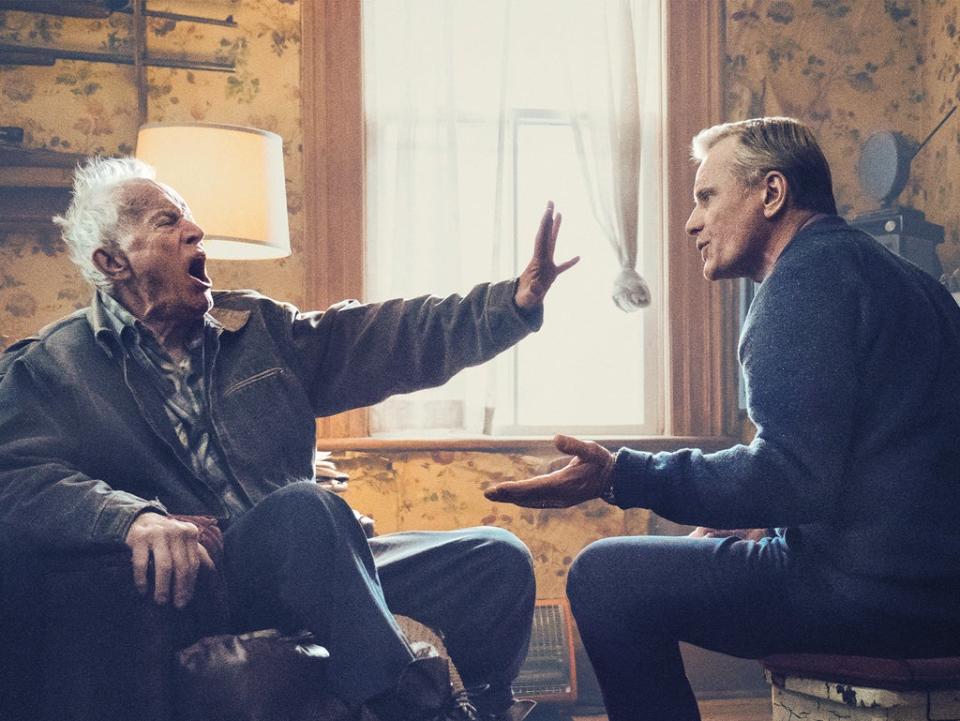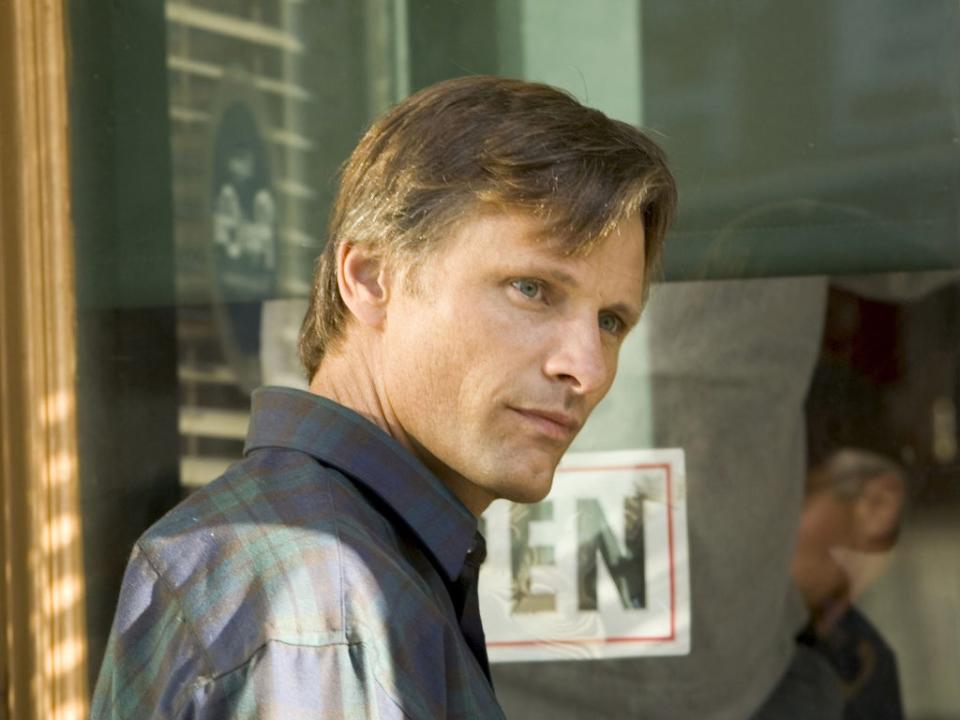Viggo Mortensen: ‘The criticism of Green Book is based on a load of bulls***’

Viggo Mortensen is railing against the fate of Green Book. Peter Farrelly’s feelgood film seemed to have reached the Hollywood pinnacle when it picked up the Academy Award for Best Picture last year. Set in segregated Sixties America, it told the true story of the burgeoning friendship between a black classical pianist and his bigoted Italian-American driver. Mortensen himself was nominated for Best Actor. But, he tells me, bleakly, “It’s become a cliché to say, ‘Is this movie going to be the Green Book of this year?’ Green Book has become a pejorative.”
The film has been attacked for fitting into a history of white saviour narratives. Mortensen found the opprobrium “hurtful and destructive”. “Much of the criticism that was levelled at that movie was not only unreasonable, but it was inaccurate, mendacious, and irresponsible,” the Danish-American star says on Zoom from his home in Madrid, where he lives with his wife, the actor Ariadna Gil. “It’s based on a load of bulls*** and an axe to grind and little else. Does it affect what I’m doing, or how people perceive me as an actor? Maybe it does. But I can’t really do anything about that.”
In person, Mortensen is something of a paradox. Humble, solicitous, and with a rollie never far from his mouth, the 62-year-old exudes a gentle gravitas. He listens attentively; his answers are considered and couched in soothing tones. The New York Times once called him “Hollywood’s most appealing man probably because he is Hollywood’s least threatening man”. Fittingly, he trades in laconic complexity – whether he’s Aragorn, the sword-wielding adventurer-king in The Lord of the Rings, or Nikolai, the Russian mobster in David Cronenberg’s Eastern Promises (for which he received his first Oscar nod). Yet for someone so calm and softly spoken, he certainly has a divisive opinion or two.
His latest film, which he wrote, directed, scored and stars in, is called Falling, and, like Green Book, it has caused controversy. Essentially a drama about a married gay liberal who struggles to care for his homophobic, conservative, dementia-addled father, Mortensen’s directorial debut is a confident and deeply personal meditation on forgiveness and human fragility. That said, Mortensen’s decision to cast himself as a gay character has ruffled a few feathers. In recent years, there’s been a growing consensus that LGBT+ roles are too often given to straight actors. But, as a director, Mortensen says “he wouldn’t think of asking someone what their sexual orientation or identification was. Neither do I assume that actors who identify as being homosexual only want to play homosexual roles. I wasn’t intending to play [the gay son] John, but I ended up playing him, because I had a high enough profile, and I also didn’t have to pay the actor.
“But,” he continues, “in terms of writing the role, it wasn’t some kind of stunt to be politically relevant. I just felt, ‘In the next scene, we’re going to meet the wife. Maybe it’s not a wife, maybe it’s a husband, what would that be like?’ And I tried writing the scene and I liked it, and I liked the additional layers that it gave to the relationship between John and his father. That’s how it happened – organically. But, yes, there’s no need to ask people how they see themselves. What’s important to me is the person that will do a good job in this role.”
Mortensen began writing Falling on the flight back from his American mother’s funeral in 2015. At first, he wanted to note down his memories of her “so as not to forget them”. But he soon decided that the bones of what he had written would make for a good story. “So it became something inventive really, with the initial inspiration being my mother, and memories about her with my dad,” explains Mortensen, whose Danish father died in 2017. “Things I remember from childhood, from my adolescence. There are fragments of conversation or experiences that my brothers, Charles and Walter, would recognise.” A flashback sequence where the father takes his young son duck shooting, for example, is mined from Mortensen’s own childhood. “Unusual that a father would let a kid that young shoot a gun,” he says. And the film's portrayal of dementia is true to his experience, too. “It comes from intimate experience that I’ve had with that disease with my parents, my grandparents, step-father and so on. I mean, some things are true, but mostly it’s just imagined.”
Which is to say the father, Willis, is thankfully not that much like Mortensen's. Played by the beloved character actor Lance Henriksen (Aliens, Terminator), Willis has grown into a venomous old man who rattles off fusillades of homophobic and racist abuse as standard. Even Picasso is on the receiving end of Willis’s ire when he visits the museum (“commie greaseball who painted like a retard”). So offensive is Willis, in fact, Mortensen struggled initially to secure a US distributor for the film. But he is optimistic that people will have at least some sympathy towards Willis. “A character like Willis,” he explains, “no matter how odious his behaviour and his language might be most of the time, I think people are more conscious of the fact that old people are people too. I think that’s a positive aspect of the coronavirus pandemic, there’s more of an awareness, even young people who naturally don’t pay much attention to old people.”

I wonder if he originally set out to embody some of the clear divides in the US today, not just between young and old but between progressive and conservative. Is the film a reflection on a splintered American society? “Well since I wrote it, the divide has grown by leaps and bounds and not just in the United States,” says Mortensen, who studied politics and Spanish at New York’s St Lawrence University. “I mean. I would call it the other pandemic.” Fear and ignorance, he explains, have resulted in “hate speech, hateful behaviour, racism, homophobia and misogyny. And like the Covid pandemic, it’s highly contagious. But, yes, I was aware as I was writing it that the Obama presidency had definitely encouraged certain types of people to come out of the woodwork.”
Given that Mortensen is such a polymath – he is also a part-time poet, painter, publisher and musician – it’s perhaps surprising that it’s taken him so long to direct his first film. But then his movie career only began when he was 27, with a small part opposite Harrison Ford in the thriller Witness. Before Hollywood opened its doors to him, he’d lived a peripatetic life. Born in the US, he spent time in Venezuela and Denmark before settling in Argentina, where his father managed farms and cattle ranches. After his parents divorced when he was 11, he moved to upstate New York with his mother. By his mid-twenties, he had worked as a truck driver, shipyard worker and flower seller.

Fast-forward almost four decades and Mortensen is now one of film’s most intriguing leading men. Think of him as the small-town family man who hides a dark past in 2005’s A History of Violence. Or the post-apocalyptic survivor in 2010’s Cormac McCarthy adaptation The Road. Or his Chomsky-loving rural eccentric in 2016’s Captain Fantastic, for which he received his second Oscar nomination. It’s for The Lord of the Rings, however, that he is best known. Having replaced Stuart Townsend, who was fired by Peter Jackson a day before filming began, Mortensen became the trilogy’s breakout star. In an interview with The Daily Telegraph in 2014, he said that The Fellowship of the Ring was the best of the three. “The second movie,” he explained, “already started ballooning, for my taste, and then by the third one, there were a lot of special effects. It was grandiose, and all that, but whatever was subtle, in the first movie, gradually got lost in the second and third.” His comments caused a stir.
Today Mortensen is less critical. “I don’t really want to get into it,” he says, “but over the years certain things that I’ve said have been taken out of context in certain ways that were unfortunate. I’ve tried to be honest when someone is asking me which movie I prefer. My preference is certain scenes that I remember and that’s natural, but the overall experience was fabulous, unforgettable, instructive. The obvious benefit is that the popularity of the trilogy around the world opened doors for us. Dave Cronenberg wouldn’t have been permitted to cast me in A History of Violence had it not been for the popularity of the trilogy, for example.”

Mortensen also found himself in hot water around the time of the 2016 presidential election after he refused to endorse Hillary Clinton, calling her a “moderate Republican” and instead offering his support to Jill Stein, the Green Party nominee. He later stood by that decision, telling The Times in 2018: “In the long run, the Clinton model was not going to be good for the country. And [the Trump administration] is painful right now, but the reaction is going to bring something much better.”
How does he feel about the situation in the US right now, with Donald Trump still calling for last month’s election to be “overturned”? “Well, I feel increasingly alarmed and not altogether surprised,” says Mortensen. “I always thought, if he does lose to Joe Biden, you know, he’s not going to accept it.” He laughs ruefully. “They’ll probably have to drag him out of the White House kicking and screaming.”
Falling is out in cinemas now

